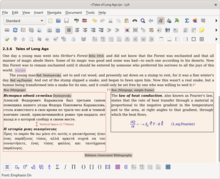 Screenshot of LyX 2.3.6 on Linux | |
| Developer(s) | The LyX Team |
|---|---|
| Initial release | 1995 |
| Stable release | 2.4.2[1] |
| Repository | |
| Written in | C++, Qt 5[2] |
| Operating system | ChromeOS, Linux, Mac, Windows |
| Available in | 25 languages |
List of languages Arabic, Basque, Brazilian Portuguese, Bulgarian, Czech, Dutch, Finnish, French, German, Hungarian, Indonesian, Interlingua, Italian, Japanese, Norwegian (Bokmål), Norwegian (Nynorsk), Polish, Portuguese, Russian, Simplified Chinese, Slovak, Spanish, Swedish, Traditional Chinese, Ukrainian | |
| Type | Document processor |
| License | GPL-2.0-or-later |
| Website | www |
LyX (styled as LYX; pronounced [ˈlɪks][3]) is an open source, graphical user interface document processor based on the LaTeX typesetting system. Unlike most word processors, which follow the WYSIWYG ("what you see is what you get") paradigm, LyX has a WYSIWYM ("what you see is what you mean") approach, where what shows up on the screen roughly depicts the semantic structure of the page and is only an approximation of the document produced by TeX.
Since LyX relies on the typesetting system of LaTeX without being a full-fledged LaTeX editor itself, it has the power and flexibility of LaTeX, and can handle documents including books, notes, theses, academic papers, letters, etc. LyX's interface is structured so that while knowledge of the LaTeX markup language is not necessary for basic usage, new LaTeX directives can be added into the document to support more complex features during editing — though not at the level of full control a full-fledged LaTeX editor can provide.[4][5][6]
LyX is popular among technical authors and scientists for its advanced mathematical modes, though it is increasingly used by non-mathematically-oriented scholars as well[7][8] for its bibliographic database integration[4] and its ability to manage multiple files.[4] LyX has also become a popular publishing tool among self-publishers.[9][10]
LyX is available for all major operating systems, including Windows, MacOS, Linux, UNIX, ChromeOS, OS/2 and Haiku. LyX can be redistributed and modified under the terms of the GNU General Public License and is thus free software.
- ^ "[lyx-announce] LyX 2.4.2 Released". 3 October 2024. Retrieved 3 October 2024.
- ^ "LyX wiki | LyX / New in LyX 2.2". wiki.lyx.org.
- ^ "LyX Wiki: Pronunciations". wiki.lyx.org.
- ^ a b c "LyX | Features". www.lyx.org. Retrieved 15 July 2019.
- ^ "Is LyX an editor which should be recommended?". TeX - LaTeX Meta Stack Exchange. Retrieved 15 July 2019.
- ^ "editors - What are the benefits and drawbacks of Lyx compared to TeXnicCenter". TeX - LaTeX Stack Exchange. Retrieved 15 July 2019.
- ^ "LyX wiki | LyX / Using LyX for Linguistic Papers". wiki.lyx.org.
- ^ "LyX wiki | LyX / HumanitiesLyX". wiki.lyx.org.
- ^ "LyX and Lulu | Linux Journal". www.linuxjournal.com.
- ^ "LyX wiki | LyX / ProducedPublications". wiki.lyx.org.